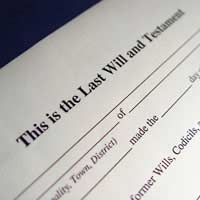Wills and Living Trusts

A living trust can be a very useful legal tool, particularly in circumstances in which an individual wishes to protect their assets from creditors, or ensure that the probate process is avoided by their heirs and beneficiaries. If such a trust is being constructed, it tends to be for a lasting purpose. The natural desire, therefore, is to codify the trust in a will. Generally, however, this demonstrates a significant misunderstanding of the nature of a living trust.
Nature of Living Trusts
Living trusts (or inter vivos trusts, in legal terminology) are established by an individual during their lifetime. This individual, known as the settlor, may have a variety of reasons for establishing the trust; living trusts are most commonly used to divorce the settlor from their assets in some way, perhaps with the intention of mitigating a tax bill or avoiding the probate process in the future. As can be seen, therefore, living trusts may be established with a view to affecting the situation either of the settlor or of their heirs.It is perfectly possible to establish a trust in a will. However, a trust created in this way is not a living trust at all – rather, it is a testamentary trust. The latter type comes into effect only after the death of the settlor (or, more correctly, the testator), and can therefore not be said to be an inter vivos trust. Testamentary trusts have a number of significant uses, particularly in situations in which, for example, the testator wishes to provide an income for a minor using a portion of their estate. The key fact, however, is that trusts established in a will are not living trusts at all, but testamentary.
Successor Trustees
It may still be useful to mention a living trust in a will, however. In most cases, the trust instrument will include details of successor trustees who will take over the trusteeship in the event of the settlor’s death (if the settlor had already appointed his or herself as trustee). However, this is not always the case. If the trust instrument does not include such a provision, or if the trust was not established through the use of an instrument, then the settlor may wish to give details of their preferred successor trustee in their will. This is not, however, the clearest course of action, and legal advice should always be sought in these circumstances.It should also be remembered that a will is, in itself, a type of trust. In appointing an executor of their estate, a testator is granting the powers of trusteeship. Depending on the terms of the will, the executor may have significant powers regarding the disbursement of the assets that make up the estate; this individual should, therefore, be highly trusted. A simple will is not, however, always the most effective method of inheritance planning. It will not, for example, make provision for the use of inheritance tax exemptions for both the testator and their spouse; a Nil Rate Discretionary Trust is better for this, as is explained in another article in this section.
Business Energy With a Difference
If you are looking for business energy or need advanced solutions like remote energy monitoring, new supplies, downgrading or upgrading capacity, have a no obligation chat with Purely Energy.
To find our more get in touch here. or call 0161 521 3400.








